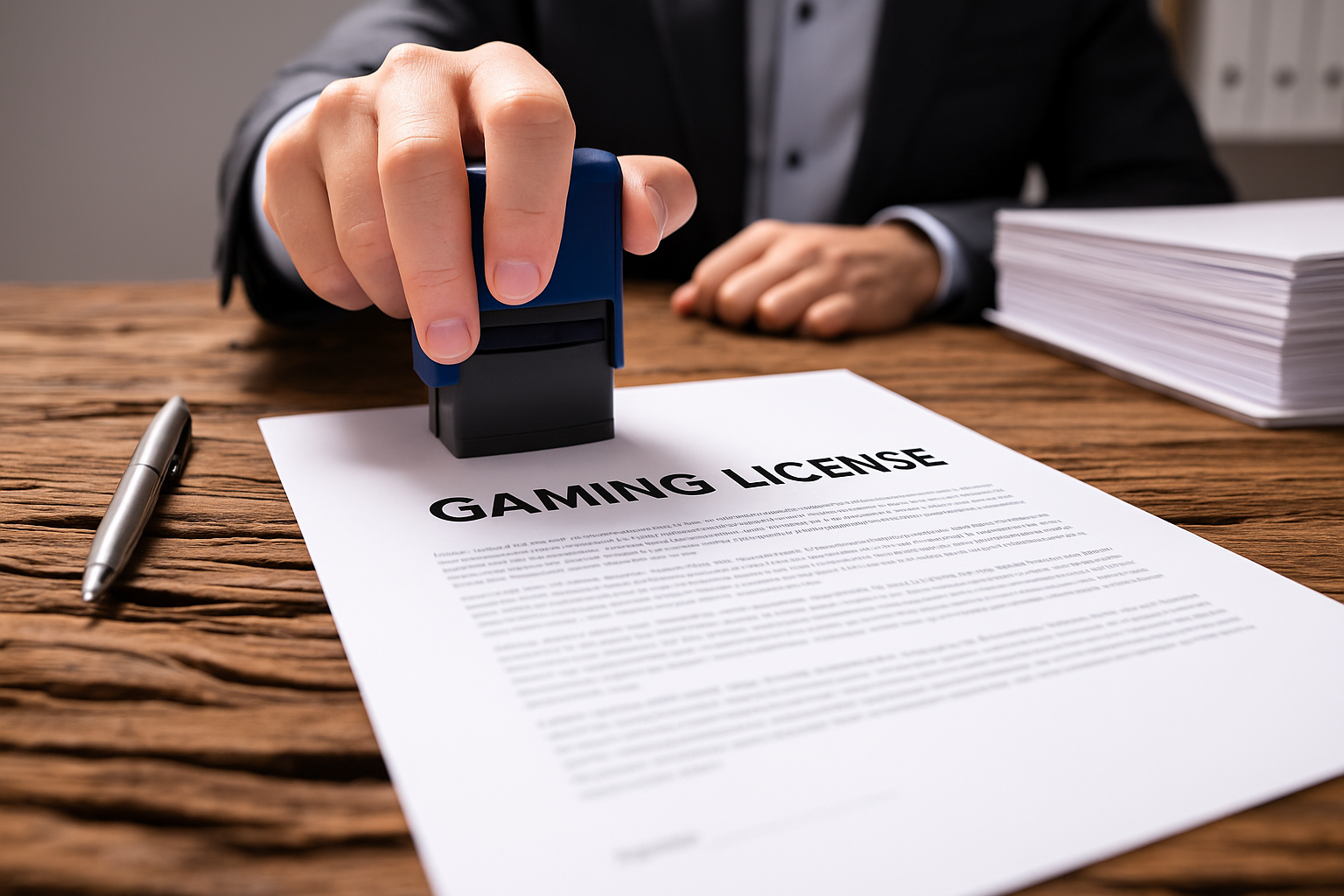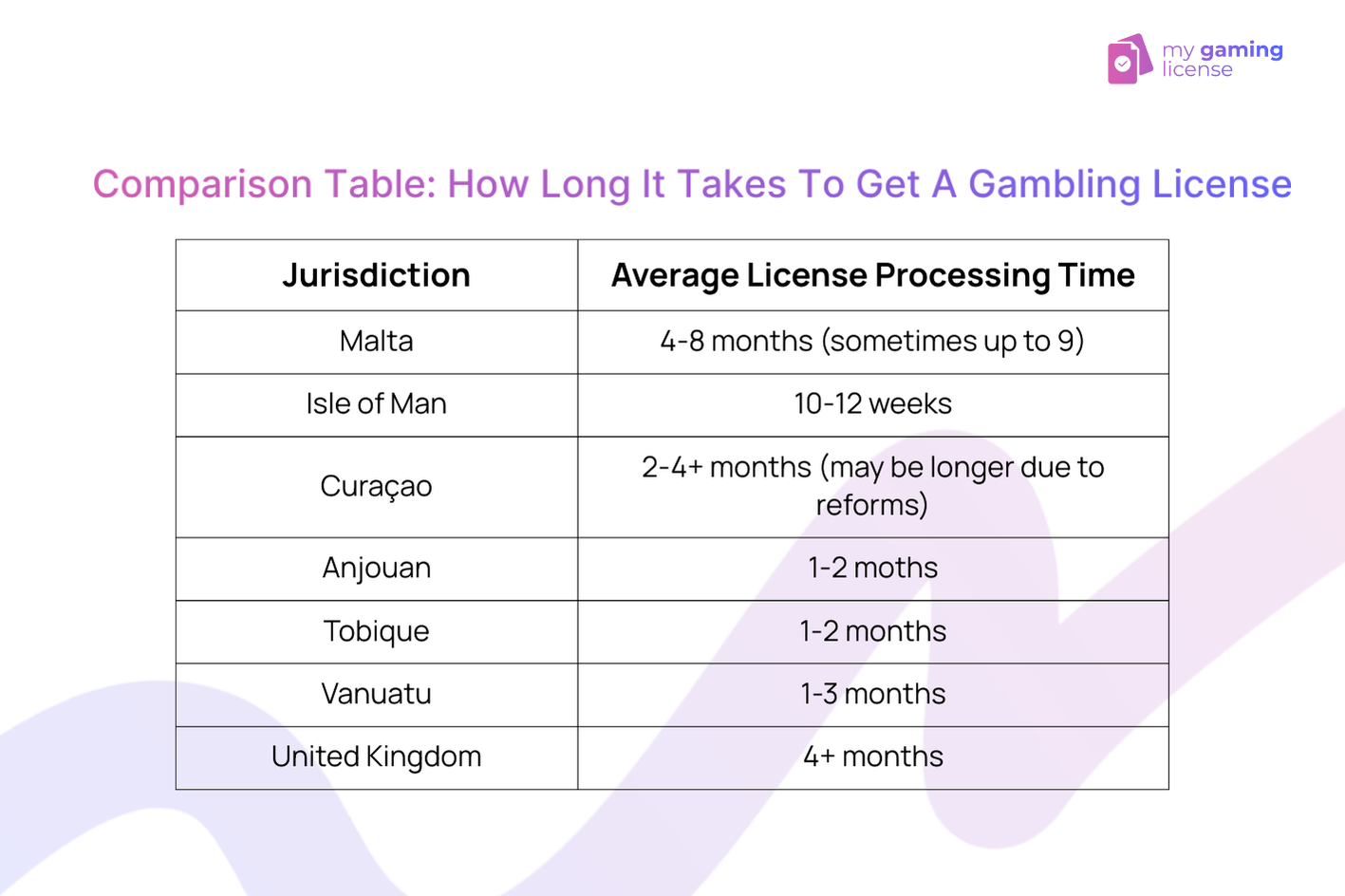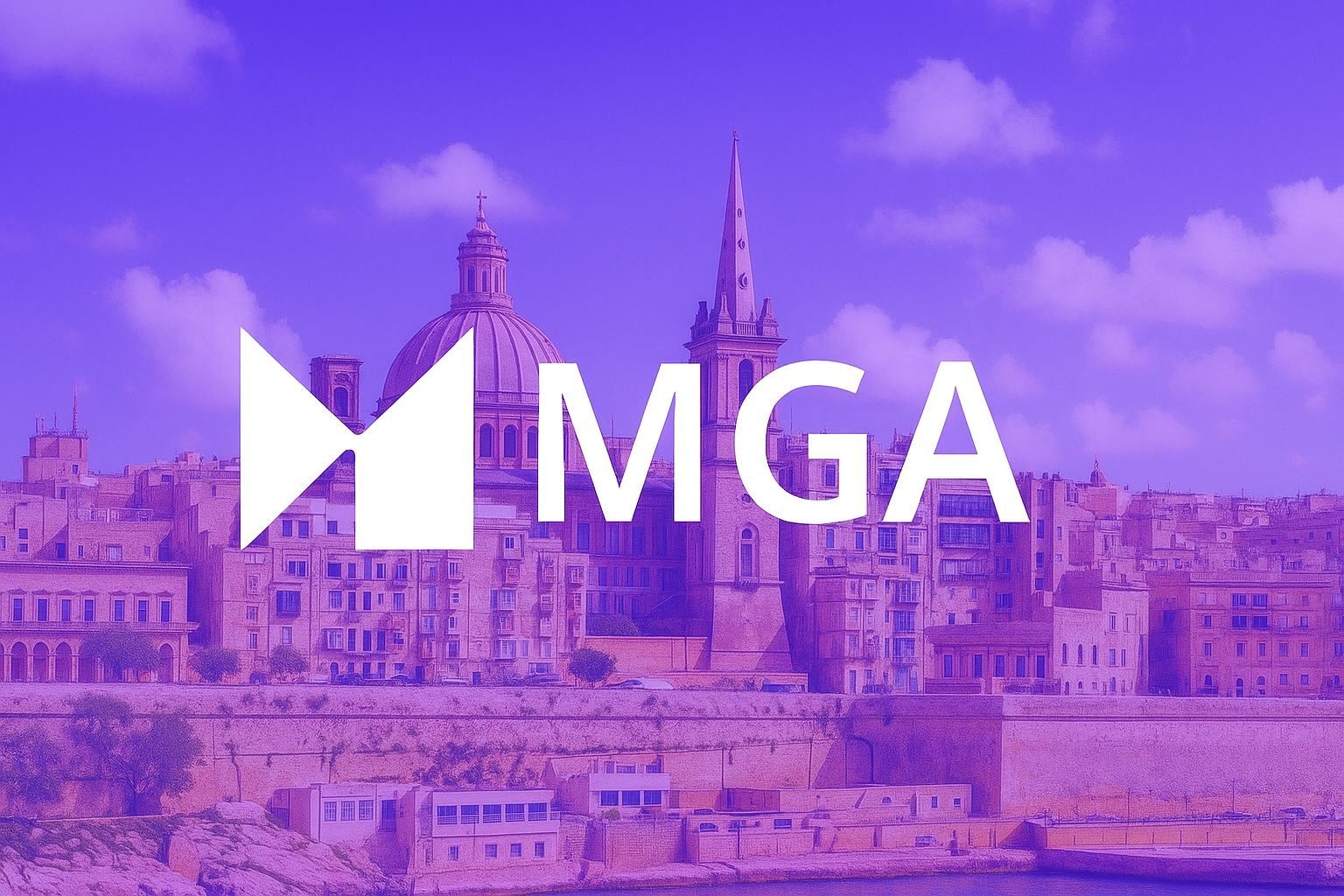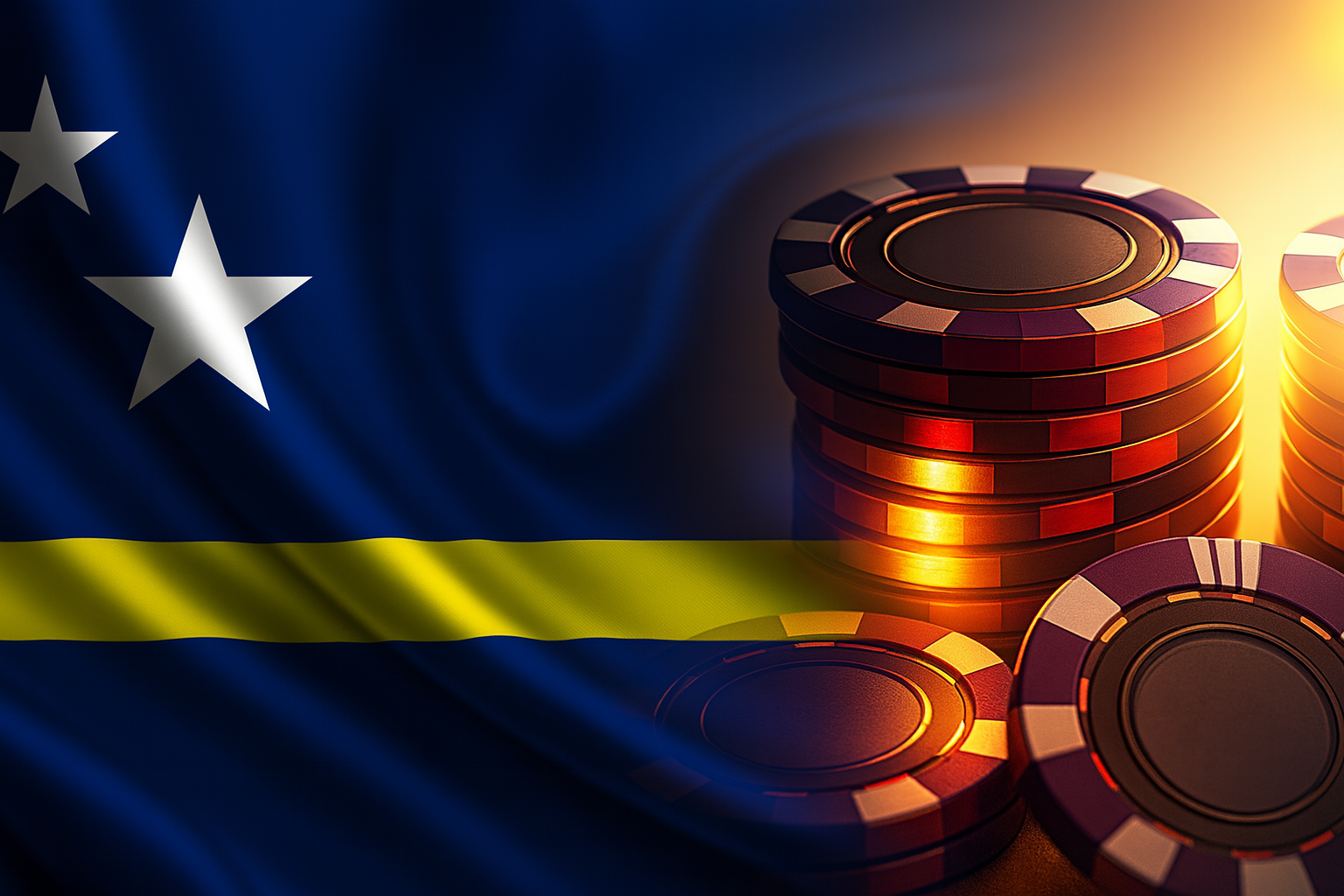A gaming license is an approval for regulated markets. Authorities in different jurisdictions issue licenses to operators that want to legally run their gambling businesses in those places.
A license is truly an entry ticket to a better world. If you want to build gambling online, you need a license. That’s the only way you can partner with trusted PSPs and games providers, expand your business to new markers, sell your gambling software to ‘big fishes’, and attract more players.

But without a license, the life of online gambling operators is not so easy. They face fines of millions, their websites shutdowns, and even worse, criminal prosecution.
Why do many operators choose this thorny path full of fines and sanctions? They believe that getting a license takes a very long time.
We’re here to debunk that myth.
Comparison Table: How Long It Takes To Get A Gambling License

Description: These timeframes reflect only the regulatory processing period. They don’t include the preparation phase.
What Is a Gaming License and Why Is It Required?
Licenses mainly exist to keep a country’s gambling market in check. With a license, operators can open online casinos, sports betting or poker websites, start lotteries, and develop casino software within a specific region.
The only few things differ from place to place — what requirements are and how long it takes to get a gaming license.
For example, if the operator plans to target players in Malta and other EU countries, the license is required. The thing is that Malta is one of the first EU countries with a dedicated online gambling regulatory legislation.
To get a B2C license, the operator must pass a “fit and proper” test, submit detailed business plans, and meet capital requirements of €100,000 minimum for games of chance. That’s not the end.
The MGA, the main regulatory body in the country, requires that gaming servers and infrastructure be located in Malta. After 7-9 months, when the operator gets a license, they will pay annual fees and pass regular compliance audits.

Why a Gaming License Is Required
Let’s break down why your gambling business needs a license in detail.
Legal Authorization on the Market
A gaming license is required when operators want to play by the rules and offer sports betting or online casinos legally. It helps to dodge fines and business closure and puts down strong roots for your business.
Earning Their Trust
The majority of players don’t see the difference between regulated and unregulated markets in the online gaming industry. They understand that this is important only after they lose their money. Next time they will search for a reliable operator with a license in a respected jurisdiction to avoid any fraud. And they will find you.
Getting Your Business Out There
Obtaining a license is the next step for any operator. They enter regulated markets and expand their customer base legally. With a license, they can easily build a strong partnership with respected software and payments providers, and other stakeholders in the industry. Plus, legal operations in some jurisdictions give the benefits of low-tax rates.
Despite these reasons, a license gives operators legal legitimacy and shows that the licensee complies with laws, protects players, partners with trusted payment and games providers. A license is a ‘green flag’ in the online gambling industry. We all know that healthy relationships start with green flags, not red ones.
Steps and Procedures for Obtaining a Gaming License
Every applicant will face the key stages on the way to getting a license in the jurisdiction they want.
Step 1 Pick A Country
Different regions offer different conditions. As a rule, jurisdictions with a strong reputation have strict rules and higher fees, while others offer less credibility but quicker and more affordable approval process.
Step 2 Register Your Business
Your company needs to be officially registered in the place where it’s applying. It could be a legal entity, like an LLC, corporation, or something else. Then you need to submit details about the ownership structure, shareholders, and directors to the authorities.
Step 3 Prepare Necessary Documents
Collect the documents required by the country you choose. These usually include personal documents for owners and key employees, such as passport copies, utility bills, a clean criminal record, CV, and proof of funds, as well as incorporated documents, AML, and Know Your Customer (KYC) policies.
Step 4 Pay Application Fees
There is no single fee structure; each jurisdiction has its own one. The Malta incense costs from 25,000 to 100,000, depending on the business size and type. Licensing in Kahnawake costs around $40,000 for the first year.
Step 5 Submit the Application
Once fees are paid and all necessary documents are collected, operators submit the application to the authorities.
Step 6 Awaits Approval
The authorities need time to run background checks on owners and executives to make sure they have crystal clear criminal records. The approval process includes reviewing financial records, confirming the operator has enough funds.
All these checks take from some weeks to several months. Anjouan and Vanuatu are well-known for a quick application process that takes around 2-4 or 4-8 weeks. Application in Malta had less luck, because it requires more time, 4-8 months.
Factors Influencing the Timeframe for Licensing
As mentioned above, the timeframe for obtaining a license varies from place to place. Why?
There are several main reasons:
What Jurisdiction Is It
Jurisdictions don’t all have the same timeframe for application approval. In the UK, it takes around 16 weeks, while in Malta it usually takes about 6 months, and in the Isle of Man, 10–12 weeks. The time depends on specific rules in the jurisdiction.
How Busy the Regulators Are
If a lot of applications are being processed when you apply, it might take longer to get a decision. The same thing happened in Curaçao after the LOK law passed—regulators had a heavy workload, and applicants waited several months for approval.
How Well-Prepared It Is
Delays can happen when an applicant misses or provides incomplete information during submitting all required documentation. If something’s missing in your business plan, the authorities can request more information. If there are delays in your responses, the whole process will take longer.
How Complicated It Is
Applications can be more complicated—like those with complex ownership, tricky funding—take longer to review. Things like working in multiple countries or having a complicated business setup also slow down the process because they need a closer look.
Average Timeframes Across Different Jurisdictions
We can divide all jurisdictions into two main categories: shortest and longest licensing periods.
The first category includes places that offer the quickest licensing times. In Anjouan, you might have your license in just 3-4 weeks. In Tobique, within 4-8 weeks. If speed matters more than strict regulation, this path could be exactly what you are after.
The second group doesn’t rush. Malta likes to take its time — up to 6 months for a license. The UK isn’t far behind, usually around four. Unlike the first group, these regions dive deep — strict rules, detailed background checks, and no shortcuts on compliance.
The truth is, it’s a bit messy in other jurisdictions too.
Curacao has the most unpredictable timeline after the recent legislation update. If it took around 8-16 weeks, the timeline now can be endless, because of the heavy workload of the Curacao Gaming Authority.

Compared to Curacao, Anjouan feels like giving out licenses almost right away. Application review usually takes about 3 to 4 weeks.
Tobique also has a fast processing time of 4 to 8 weeks. In Vanuatu, you could have a license, once your paperwork is in order.










Recommendations for Accelerating the Licensing Process
To not waste your time, follow our practical recommendations for a seamless licensing process:
Gather Documentation Early
Research the specific regulatory criteria, application forms, and guidelines of the target jurisdiction to avoid surprises. When you have all the necessary information, start gathering the required documents as soon as possible.
In our experience, the preparation of documents could take longer than expected, especially if applications gather them without professional assistance.
Choose Expert Consultation
You’ll save time by working with experts who have experience in the chosen jurisdiction. They know how to prepare the application correctly, how to handle all the paperwork, even if it’s very extensive, and how to meet compliance.
Communicate Proactively
It’s not enough to submit a complete documentation package. The authorities watch how fast is your response to their queries and how proactively you update the authority on any changes.
Wrapping Up
It takes time to make your gambling business legal, especially in one of the top jurisdictions in the industry.
There is a simple rule in the online gambling industry: the more reputable the legislation you want, the longer you will have to wait.
The country, the type of license, and how complex your application is — all determine the exact timing.
But even in the strictest country, you can avoid delays. The only thing you need is professional assistance. Experts know nuances, where to play it safe. It will surely improve your chances of a smooth and faster approval.

Navigating the gaming license process can be complex. Here’s a streamlined guide to each step

.jpg)

.png)


.svg)

.png)